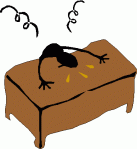
Tree Octopus
It’s a well-known fact that new animals are added to the endangered species list on a regular basis, and sadly, we can’t save them all. Species are going extinct at an alarming rate.
Today I present to you one of the latest that is sure to be on the endangered list soon: the Pacific Northwest tree octopus (Octopus paxarbolis). This awesome creature resides in temperate rainforests and lives a double life; they’re amphibious mollusks! They are extremely intelligent with amazing eyesight. They use their tentacles to climb trees in a form of locomotion called “tentaculation”. Sadly, their breeding numbers are decreasing at an alarming rate due to “decimation of habitat by logging and suburban encroachment; building of roads that cut off access to the water which it needs for spawning; predation by foreign species such as house cats; and booming populations of its natural predators, including the bald eagle and sasquatch”. (Info from the Official Save the Pacific Northwest Octopus site)
Hopefully, most people can spot the humorous and ridiculous points in the above story. But can our students?
The current student population consists of mostly tech savvy kiddos, usually much more so than we are ourselves. They’ve grown up with computers, the internet, DVD players, Playstations, cell phones, mp3 players, etc. They know the basics of using search engines to quickly find information. Surely this is a huge advancement and advantage compared to the way we had to research our projects and research papers “back in the day”. Yet teachers know that students will often go for what’s easiest (or, what gets homework and projects done the fastest) without bothering to stop and think if what they have found is valid or reliable.
Researchers at the University of Connecticut conducted a study involving the aforementioned tree octopus. The goal? To test students’ ability to evaluate information they find online. The results? Sobering. “The students not only believed all of the fabricated information, but also insisted on the existence of the octopus, even when researchers explained all the information had been made up.” (From dailymail article)
If students are going to continue to use search engines and the internet in general, teachers must incorporate ways to show them how to do so properly. We need to teach them how to validate the content they find online. Much of what has been taught in the past on reading critically is, of course, still applicable.
- What is the nature of the information being presented? Is it original data, summaries of original data, anecdotal, etc?
- Is the information current?
- Are sources clearly documented?
- What are the credentials of the original information and the sources listed?
- Is the information verified by others in the field?
- What is the purpose of publishing the information? Is it geared to simply inform, sell a product, entertain, etc?
There are several good articles (on the internet! ha) about validating information and reading critically. Here are a few, in no particular order:
Assessing and Validating Information Found on the Internet
Critical Reading Tips from Indiana University
E-how article on validating internet info
Evaluating Internet Information from Johns Hopkins
Fellow teachers, I urge you to broach this topic when an assignment comes up in which you know students will be using the internet for research.
P.S. Also, if we all teach critical reading and validation, then Wikipedia can be used. It is not the devil. 🙂
 There’s a debate brewing in France over letting
There’s a debate brewing in France over letting Jenga. Who doesn’t love it?
Jenga. Who doesn’t love it?